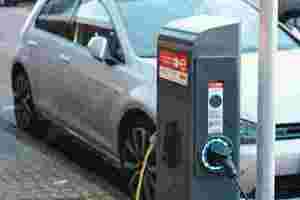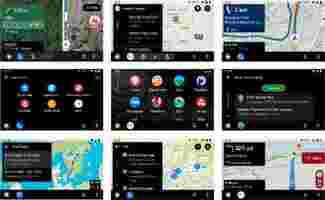Compulsory EV chargers give retailers a chance to win back UK shoppers
We reported in September that the UK was making the installation of EV chargers a prerequisite for newly built homes and offices. But now it’s official, with British Prime Minister Boris Johnson formally announcing the initiative at the CBI annual conference.

From 2022, new homes and buildings such as supermarkets, shopping malls, and workplaces will be required to install electric vehicle charging points.
Specifically, new office blocks will need to install a charge point for every five parking spaces, and the regulations also apply to large scale renovations with over ten parking spaces.
It was a strange bumbling speech, as reported by the BBC , where the British Prime Minister Boris Johnson lost his place in his notes and referenced a visit to Peppa Pig World. He also made some bold statements:
“This is a pivotal moment — we cannot go on as we are” and “We have to adapt our economy to the green industrial revolution.”
The sale of new petrol and diesel cars will end in Britain in 2030.
Substantial investment in EV charging
The UK government has funded over 250,000 home and workplace charge points to date, through the Electric Vehicle Homecharge Scheme (EVHS) .
These grants provide a 75% contribution to the cost of one charge point and its installation. The grant cap is $467 (£350) including VAT per installation.
The main requirement is that a person owns, leases, or has ordered a qualifying vehicle and has dedicated off-street parking at their property. A person may apply for two charge points at the same property if they have two qualifying vehicles.
But what if you don’t have off-street parking?


According to EV charger company Ubitricity, more than 60% of households in English cities are without off-street parking. These numbers rise to 68% for people living in social housing. Access to affordable street-based EV charging will be essential for this substantial group to enter the EV market.
It’s hardly a saturated market — yet
However, electric and hybrid vehicles only make up 44.1% of new cars purchased in the UK this year.
However, as of September 21, there were more than 675,000 plug-in vehicles with approximately 345,000 BEVs and 325,000 PHEVs registered in the UK. Clearly, we’re going to need a lot more chargers both at home and in public. According to Zap-Map, there are currently over 17,374 locations with public chargers (one of more charging points in the UK).
Shopping malls and strips, here’s your chance to win back the punters
Overall, I’ll be interested to see if public EV charging requirements could be used as a catalyst to re-energize public spaces. I’m thinking specifically of areas like High Street retail shopping strips and shopping malls. These are critical examples of bricks and mortar retail that died a horrible death as we all moved our shopping online.
EV chargers put businesses on the map (literally in the case of EV charging maps). They create the opportunity for new customer incentives and relationships.
It’s an opportunity for new business models that, if done right, could transform public retail spaces for the better into something relevant and responsive to public needs.
Horrendously, Ford wants to turn your EV into an office
Ford has a weird habit of extravagant marketing strategies. I’ll never forget the petrol-scented perfume the company launched to accompany the electric Mustang Mach-E GT. I mean, who doesn’t want to smell like gasoline?

But now there’s a new marketing campaign to wrap our heads around: online conference calling for… EVs .
As if the Zoom fatigue of the past two years and the transformation of our homes into working spaces weren’t enough, Ford has a vision of your car becoming the “best mobile office.”
To make this happen, the automaker has teamed up with Cisco , which will integrate its Webex video conferencing app into the infotainment systems of Ford’s new EVs — like the F-150 Lightning , for instance.
You can take a look at the promo video below:
Called “Webex on the Go,” the app enables potential in-car workers to access meetings hands-free with voice activation.
Plus, to make sure that background noise won’t be an issue — because say, you hop on a meeting while driving your kids to school — Ford will also integrate Webex Audio Intelligence, so people can use the Optimize for My Voice feature.
And don’t you worry about being distracted while driving. Because the online calls will be restricted to audio mode when the vehicle’s on the move, video will only be activated when the car’s parked.
After all, everyone knows that it’s impossible to get distracted by being fired when you only hear it — you’ve got to see the person who’s consigning you to poverty for your attention to waver.
As per Darren Palmer, Vice President, Ford Electric Vehicle Programs:
Well, I can think of a few reasons.
Imagine having an important meeting while your children are fighting in the back seat. Or say a meeting lasts longer than expected, will you just park somewhere and stay inside your car for an extra hour?
But, most importantly, in-car online meetings invade another personal space. Your commute shouldn’t be an extension of your work, but a time you can use to relax and rewind.
I can understand the use of such apps in autonomous vehicles, but until we’re there, a vehicle’s purpose is to take you places — not to serve as a mobile office.
Android Auto is about to get heaps more navigation and EV charging apps
Users of Android Auto should start to see a greater selection of in-car compatible apps on the Play Store.

According to an announcement on Google’s Android developer blog , Android Auto devs working on navigation, parking, and EV charging apps can now push them to production.
In other words, apps from the likes of Chargepoint, PlugShare, A Better Route Planner, and T Map, should start appearing on the Play Store very soon.


By pushing the apps to production, it means drivers can now use the apps as part of Android Auto on their car’s main infotainment screen without needing to be signed up to the beta program.
In effect, this should mean that Android Auto users will have a greater selection of polished apps to enhance their driving experience.
Ultimately, when it comes to planning a trip or finding a charging point for your EV, everyone has their preferences. Platforms like Android Auto opening up more choice to the consumer, can only be a good thing.
Do EVs excite your electrons? Do ebikes get your wheels spinning? Do self-driving cars get you all charged up?
Then you need the weekly SHIFT newsletter in your life. Click here to sign up .